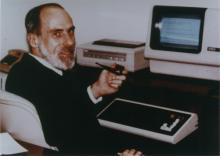We will be ghosts in history if we do not do something about the preservation of digital data, warned Vinton Cerf, who is often referred to as the “father” of the internet, and has been Google’s official evangelist since 2005. In his presentation and subsequent press conference at the Heidelberg Laureate Forum, he stressed that we had the right not only to oblivion but also to the preservation of information, which today runs into great many technical and legal obstacles. (Heidelberg Laureate Forum is an annual event where talented young researchers have the opportunity to meet scientists who have received awards, equivalent of the Nobel Prize, in mathematics or computer science.)
Vinton Cerf said that it would be difficult even today to find documents about important events in internet history. Initially, they worked out processes on paper, but as e-mail was introduced and joint work became easier, archiving information became all the more difficult. Early e-mail messages could not be accessed today and important conversations were lost. Cerf is convinced that the absurd situation has arisen when the 1960s will be seen as better documented than the 1980s in a hundred years’ time perspective.
A solution often suggested to Vinton Cerf is consistently converting the most important data in the latest existing formats, and the rest can go into the trash. However, Cerf keeps repeating that we do not have the right to decide what important information is for the future and what is not. When Cerf and Robert Kahn worked out the basics of connected networks in the conference room of a hotel in California, they took notes on a yellow note pad. After their secretary had typed them up, she asked them what to do with the notepapers. They told her to simply throw them into the bin. Today they are often reproached for this irresponsible act.
And how hopeful is Vinton Cerf of finding a solution? He prints most of the documents he considers to be important – just to make sure.

